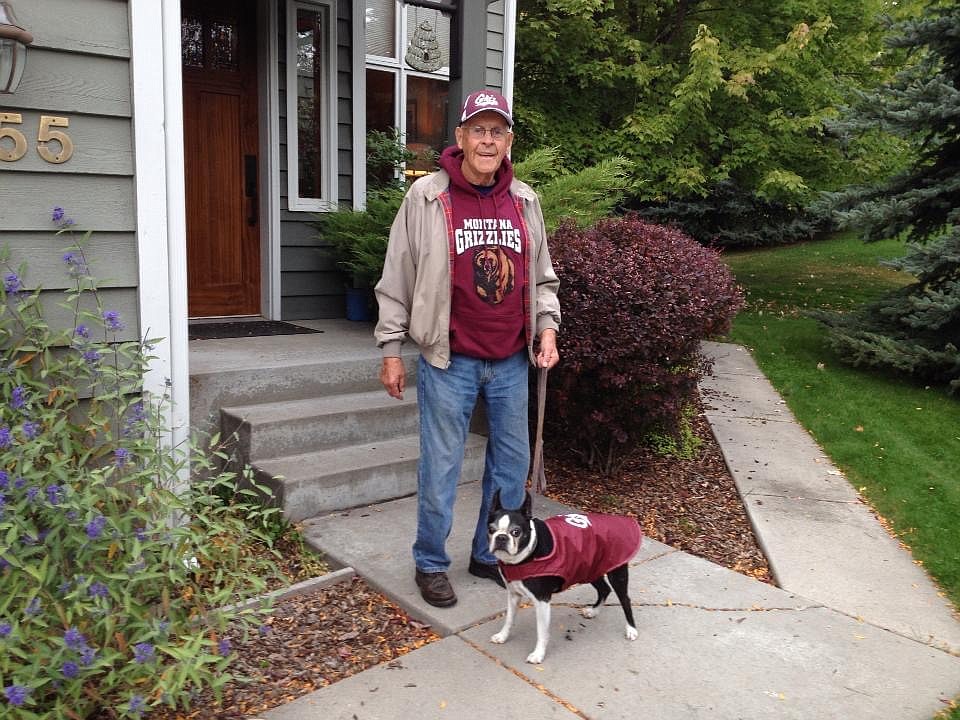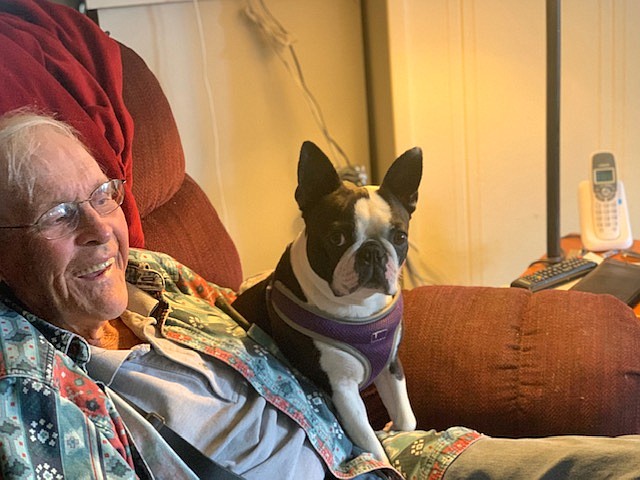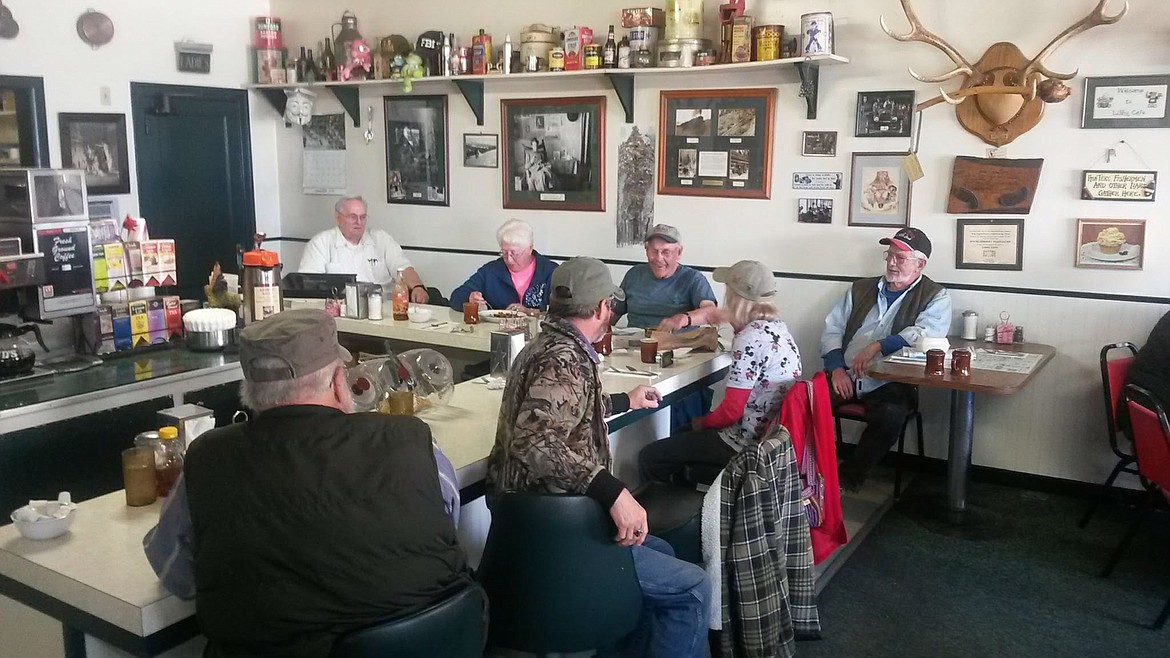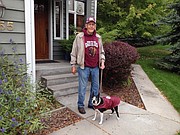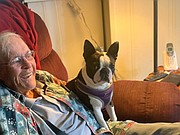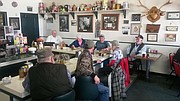'He died alone, without family'
When Earl Stanley moved into the Libby Care Center after an injurious fall in early July, his family expected him to be back on his feet within a few months.
Though Stanley was 89 years old and suffered a broken shoulder and hip, his niece Karen Wickersham said he had lived independently into his old age and had no other underlying health conditions. His bones were knitting together well and by October he should have been back home, doting on his Boston bull terrier and smoking his pipe.
But around the end of July, the coronavirus began spreading through the local nursing home. Stanley tested positive soon after and on Aug. 11 — the same day Wickersham said she had helped prepare Stanley’s house for his return — he died of complications related to COVID-19.
Relatives expressed outrage over Stanley’s death in the days since, saying he could still be alive had more staff members at the care center received vaccines. Wickersham said nurses had told her the outbreak, which had spread to 11 staff members and left two residents dead, one hospitalized and 34 infected as of last week, was started by an unvaccinated employee.
“We [mask up and get vaccines] not just for our own safety, but to protect others,” said Wickersham. “The fact that Earl got it because someone chose not to get vaccinated is beyond infuriating and speaks loud and clear of that caregiver’s selfishness.”
Executives at Cascadia Healthcare, the care center’s parent company, believe a staff member who tested positive for the virus set off the outbreak, according to Steve LaForte, director of corporate affairs and general counsel at Cascadia. LaForte said he couldn’t say if the employee was vaccinated as the company keeps statistics on employee vaccination status in a blind database. This means that Cascadia officials can see how many of its employees are vaccinated, but not which ones.
Just under 50 percent of employees and around 83.5 percent of residents at the care center have received vaccines as of last week, LaForte said. The national percentage of vaccinated nursing home employees and residents is 60 and 82.4 percent, respectively, according to the Centers for Medicare and Medicaid Services (CMS).
In hopes of boosting vaccination rates, Cascadia executives have strongly encouraged employees to get their doses and organized incentives and an educational program for staff members.
The company has faced an uphill battle in getting more employees at the Libby Care Center to vaccinate. LaForte said a significant number of locals were “hesitant” to receive doses with some citing concerns that vaccines had not received full approval from the U.S. Food and Drug Administration.
Medical professionals and officials with federal, state and local public health agencies have repeatedly stressed that coronavirus vaccines are safe and effective for adults.
According to the Centers for Disease Control and Prevention, 31.5 percent of Lincoln County residents aged 12 and older are fully vaccinated against the virus compared to the national rate of 59.2 percent. The state Department of Public Health and Human Services listed a slightly higher vaccination rate of 38 percent for the county's eligible population. Local public health officials were not immediately available for comment.
LaForte said company officials’ hands were tied, though, when it came to requiring employees to get shots. A new state law, designed to prevent discrimination based on vaccine status has kept Cascadia and other health care providers from mandating vaccination as a condition of employment.
House Bill 702, sponsored by state Rep. Jennifer Carlson (R-Manhattan) bars government entities and businesses from requiring employees, customers and others to get vaccinated. The law, which went into effect at the beginning of July, would allow nursing homes and long term care facilities to require their employees to get shots only if a federal statute obliged them to do so.
While the CDC and CMS strongly encourage vaccination of all residents and staff, the federal agencies have not issued a vaccine requirement for any party, according to a July 28 memo from Adam Meier, director of the state Department of Public Health and Human Services.
Supporters of House Bill 702 touted the legislation as a means of protecting personal privacy. In addition to preventing business owners from requiring their staff to vaccinate, Carlson said she envisioned the bill as a way to keep government agencies from withholding foster care, food stamps and aid to unvaccinated families. Some supporters raised unfounded questions about the safety of coronavirus vaccines.
The bill saw strong opposition from medical professionals and representatives from public health organizations. Although much of the discussion around House Bill 702 centered around vaccinations for the coronavirus, the law applies to all vaccines.
Republican lawmakers passed House Bill 702 along party lines in the House and Senate. Gov. Greg Gianforte signed the legislation in early May. The law marks Montana as one of only a handful of states that have put restrictions on private employers in regards to vaccine requirements, according to the National Academy for State Health Policy.
“I'm so angry at the Legislature,” said Wickersham, saying the bill put nursing home residents at serious risk. “Who can be more vulnerable than people at the [Libby] Care Center?”
Despite the restriction on vaccination requirements, LaForte said Cascadia requires care center employees to continue to follow a strict protocol as dictated by CMS. Staff members must don personal protective equipment while at work and are subjected to weekly testing and regular screenings.
The center also has a separate unit for housing residents infected with the virus. A second set of staff members, who are isolated from other employees and uninfected residents, are responsible for running the unit.
While upset by the center’s low vaccination rates, Stanley’s family members still expressed sympathy for the health care workers at the care facility.
“They did the best they could at the care center,” said Lynn Stanley, another one of Earl Stanley’s nieces, noting the nursing home faced a staffing shortage in recent weeks. “It must have been harrowing and heart-breaking.”
Jack Wickersham, Karen Wickersham’s husband, said he felt that Earl Stanley’s death marked “a loss for the soul of Libby.”
Earl Stanely moved to town in the early 1940s when he was around 10 years old. He started work at the J. Neils Lumber Co. in his teens and was guaranteed a job for life after his arm went through the greenchain on his second day of work. A caring son, he looked after his destitute mother for years until she died.
Later in life, Earl Stanley became a local icon, known for walking his Boston bull terriers around Libby while puffing at his pipe. A seat, marked with a sawed-off parking meter, was always on reserve for him at the Libby Cafe. He also became a fixture in the unofficial coffee club that met at Henry’s and later at Rosauers.
“He was a good man,” said Jack Wickersham. “He was part of old Libby.”
Karen Wickersham recalled how her uncle never seemed to know a stranger. While on a vacation in Maui, he expressed no reservations, befriending practically everyone he met.
“We would go out to the swimming pool and people would ask us about Uncle Earl,” she said.
After the coronavirus pandemic began last year, Karen Wickersham said Earl Stanley was careful to follow public health measures. He wore a mask when he went out and was among the first in line for a vaccine.
While LaForte said the care center continued to allow visitations following CMS guidelines after the outbreak, Earl Stanley’s family members said it was difficult to schedule a visit. Both Karen Wickersham and Lynn Stanley said the isolation took a toll on their uncle and recalled him saying it felt as if he was in prison.
Tracy McKnight, Earl Stanley’s great-niece, said care center staff seemed to be constantly shifting her great-uncle around the center when she came to visit in early August. Karen Wickersham said his clothes and belongings were repeatedly lost as he moved between rooms.
Following his positive test result, Earl Stanley was asymptomatic for about a week before he started to need oxygen, according to McKnight.
On his final day, he appeared to be in good form, enjoying a physical therapy session and a long conversation outside. Later that evening, he dozed off while watching a western and around 5 p.m. he died in his sleep.
Karen Wickersham said her uncle’s death was not as dramatic as many other COVID-19 related deaths she had heard of — there were no nurses at his side battling to keep him alive with a ventilator — but the quiet nature of his passing was tragic in its own right.
“He died alone, without family,” she said.
McKnight said she had not expected to have much time left with her great-uncle, but losing him so suddenly came as a shock. While she had kept herself informed on the pandemic, she said Earl Stanley’s death had put the threat of the virus in sharper relief than any statistic ever could.
Family members plan to host a virtual memorial for Earl Stanley. Some relatives are too young to receive vaccines and with the number of coronavirus cases rising in Lincoln County, Karen Wickersham said the family did not want to risk gathering in town.
With bitter irony, she noted that the same local reluctance to follow public health measures that had contributed to her uncle’s death was keeping his family from his graveside.
“What are they thinking with their freedom-loving flags,” she said. “It's about ‘we’ not ‘me’ in this pandemic.”


